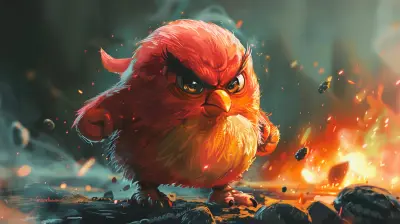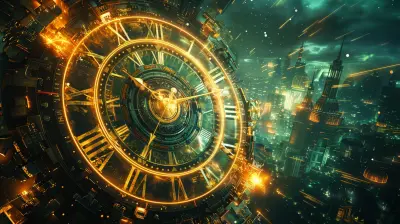Does Game Length Equal Value?
12 September 2025
Let’s be honest—how many times have you looked at a game’s runtime before deciding whether to buy it? Probably more than once, right? It’s easy to assume that the longer a game is, the better bang for your buck you’re getting. But is that really the case?
In this deep dive, we’re gonna break down the real deal behind game length and how it plays into perceived value. Are 100-hour epics really worth more than 8-hour thrill rides? Or is there more to value than just playtime? Stick around—we’re unpacking this mystery with a bit of humor, some strong opinions, and a whole lot of gamer logic.
The Temptation to Measure Value by Hours
Picture this: you see a new game on sale for $60. It promises a whopping 120 hours of gameplay. You’re thinking, “Wow, that’s just 50 cents per hour!” Seems like a steal, right?This type of thinking is super common. Players often default to measuring value in terms of hours played. It’s easy to do and makes intuitive sense. We compare games the same way we compare other forms of entertainment—movies, books, concerts. The longer the experience, the more it feels like we’re getting out of it.
But here’s the kicker: more hours don’t always translate to a better experience.
More Isn’t Always Better
Let’s say you’re playing an open-world RPG that boasts a 100-hour campaign. But 40 of those hours? Fetch quests. You’re running across the map grabbing herbs, killing the same wolves over and over, and sitting through dialogue that could put a robot to sleep. That doesn’t sound like a valuable experience—it sounds like digital busywork.Compare that to a tight, emotionally-charged 10-hour story game. Think Inside or Journey. These games don’t overstay their welcome. They leave an impact, and sometimes you’ll reflect on them longer than you ever spent playing them.
So, is it time to stop measuring games by the hour?
What Really Makes a Game Valuable?
Here’s where things get interesting. Value isn’t just about time—it’s about satisfaction. Let’s break down what contributes to the real value of a game:1. Gameplay Quality
Is it fun? Is the gameplay tight and responsive? Do you want to keep playing?A game that nails its mechanics and delivers on what it promises will always feel more valuable, regardless of length. Think of it like a great meal. It doesn't have to be supersized to be satisfying. Sometimes a perfectly cooked steak trumps an all-you-can-eat buffet.
2. Narrative and Emotional Impact
A game that tells a powerful story, builds relatable characters, or makes you feel something deep can be worth every penny, even if it's short.Games like Firewatch or What Remains of Edith Finch might only take a handful of hours to complete, but they stick with you long after the credits roll.
3. Replayability
Some games are short but have high replay value. Roguelikes like Hades or Dead Cells offer runs that last 30 minutes, but you could easily put in 50+ hours just chasing that perfect build or unlocking all the content.On the flip side, a long game with zero desire to replay it? That’s a one-and-done deal.
4. Innovation and Uniqueness
Playing a game that truly feels fresh, that does something you’ve never seen before? That’s value.Remember when Portal came out? It wasn’t long, but it bent our brains and redefined puzzle games. There’s no need for 60 hours of content when one level can blow your mind.
The Rise of Padding
Unfortunately, many games pad their runtime just to appear longer. You’ve probably felt it—you hit the middle of the game and suddenly motivation drops. The story stalls. Progress slows. You’re stuck in sidequests that feel more like chores.Why does this happen? Two reasons:
1. Marketing Pressure – A 30-hour game “sounds” more appealing to buyers than a 10-hour one.
2. Price Justification – Developers feel the need to offer more content to justify the $60 or $70 price tag.
But here’s the problem: padding can dilute the experience. That bloated 60 hours might have been a tight 25-hour masterpiece if it weren’t overstuffed with filler.
Short Games Deserve More Respect
Let’s talk about the underdogs—the short games that often get dismissed because they’re “too quick.”Short doesn’t mean shallow.
A 3-hour thrill ride like Titanfall 2’s campaign can deliver more action, surprises, and fun than some 40-hour games. And hey, it respects your time, too. No grinding, no fluff—just pure entertainment.
Plus, not everyone has the luxury of sinking 100 hours into a game. For busy adults with jobs, families, or other hobbies, a 6-hour experience they can finish in a weekend is way more practical.
The Cost Per Hour Debate
Alright, let’s crunch some quick numbers.Let’s say you buy:
- Game A: $60, lasts 8 hours = $7.50/hour
- Game B: $60, lasts 80 hours = $0.75/hour
At first glance, Game B looks like the winner. But if Game A delivers unforgettable storytelling, sleek gameplay, and zero filler, while Game B drags for 60 of those 80 hours…who’s the real winner?
Cost per hour is a nice bonus when all else is equal, but it shouldn’t be the only thing you use to judge a game’s value.
Multiplayer and Live Service Games: The Outliers
Of course, we can’t ignore the other end of the spectrum—games that go on forever.Multiplayer shooters, MMOs, and live service games (looking at you, Fortnite) can offer endless playtime. Some players rack up hundreds, if not thousands of hours in these titles. That’s insane value assuming you're enjoying the ride.
But here’s the catch: these games often encourage grindy loops, battle passes, and FOMO-tactics to keep you coming back. Are you playing because you love it, or because you’re afraid to miss out?
Ultimately, value here is super subjective. Some people thrive in infinite content. Others burn out fast.
Indie Games Are Changing the Conversation
Indie developers are flipping the script. They're proving that smaller games can deliver massive value.Titles like Celeste, Hollow Knight, and Undertale aren’t just shorter or lower-budget alternatives—they’re some of the best gaming experiences of the decade.
Because indie devs don’t always follow the same formulas as AAA studios, they often focus on creating tightly designed content with heart, soul, and originality. And let’s be honest—sometimes they hit harder than the big guys.
So, Does Game Length Equal Value?
Let’s cut to the chase.No. Game length doesn’t automatically equal value. It’s one factor—but not the most important one.
A long game can be boring. A short game can be brilliant.
What matters more is:
- Was the experience enjoyable?
- Did it respect your time?
- Will you remember it next week?
- Would you recommend it to someone else?
If the answer to those is yes, then congrats—you found a valuable game.
What Should You Look For Instead?
When choosing your next game, try shifting the focus. Don’t just ask “How long is it?” Instead, ask:- How polished is the gameplay?
- Does it offer something different?
- Do I enjoy the genre/mechanics?
- Are the reviews praising the story, design, or innovation?
Games are experiences, not just content delivery machines. The best ones leave a mark, no matter how long they are.
TL;DR - The Final Verdict
Game length is just one piece of the puzzle. The real value comes from how much you enjoy the game, how it makes you feel, and how it sticks with you. A game that’s short but powerful can be worth every cent, while a long game that drags is just a time sponge.So next time you’re eyeing a game, don’t judge it by the runtime alone. Think of it like a good book or a classic film—it’s not about how long it is, it’s about how it makes you feel.
Play smarter, not longer.
all images in this post were generated using AI tools
Category:
Gaming ReviewsAuthor:

Whitman Adams
Discussion
rate this article
2 comments
Juliet McElveen
Game length isn't everything! It's the unforgettable experiences, engaging stories, and impactful moments that truly define value. Let's celebrate games that inspire and connect us, no matter their duration!
February 13, 2026 at 5:57 PM

Whitman Adams
Absolutely! Quality experiences and emotional connections in games often outweigh their length, making memorable moments what truly define their value.
Rachel McGee
Game length is like a pizza—it's not just about the size, but the toppings! A short game can pack a flavorful punch, while a long one might just be extra crust. Quality over quantity, every time!
September 15, 2025 at 3:13 AM

Whitman Adams
Absolutely! Quality gameplay and engaging experiences matter more than just length—it's all about that perfect balance of depth and enjoyment.


